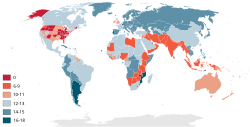Defense of infancy

Defense of infancy refers to the legal concept that children below a certain age are not fully responsible for their actions. Just like how grown-ups may be punished for doing something wrong, kids also do things that are not right, but they are typically not held accountable because they are still learning and developing. This is because young people's actions and thoughts are influenced by their age, lack of experience, and limited understanding of the world around them.
In most countries, an age limit is established under which a child cannot be punished for committing a crime. This age limit varies among countries, but it is typically set at around 7-10 years old. The reasoning behind this is that children under this age are not capable of fully comprehending their actions and their consequences, so punishing them for it would not be fair or helpful.
However, if a child crosses the age limit, they can be held accountable for their actions if they commit a crime. In those cases, the goal is not to punish them, but to provide support and guidance to help them understand the consequences of their actions and make better choices in the future.
The defense of infancy is crucial to safeguard children's welfare because it acknowledges that kids are still growing and developing and that they should not be treated the same as adults who have had more life experiences and a better understanding of right and wrong.
In most countries, an age limit is established under which a child cannot be punished for committing a crime. This age limit varies among countries, but it is typically set at around 7-10 years old. The reasoning behind this is that children under this age are not capable of fully comprehending their actions and their consequences, so punishing them for it would not be fair or helpful.
However, if a child crosses the age limit, they can be held accountable for their actions if they commit a crime. In those cases, the goal is not to punish them, but to provide support and guidance to help them understand the consequences of their actions and make better choices in the future.
The defense of infancy is crucial to safeguard children's welfare because it acknowledges that kids are still growing and developing and that they should not be treated the same as adults who have had more life experiences and a better understanding of right and wrong.
Related topics others have asked about:
